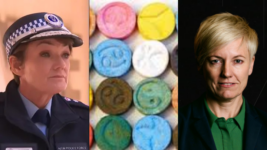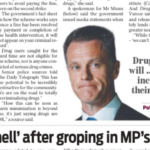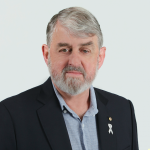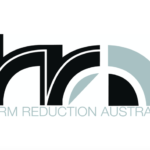Is the NSW Police Force Actively Impeding Drug Law Reform?

The Uniting Church NSW.ACT launched Fair Treatment, a campaign calling for drug decriminalisation to be rolled out in the two jurisdictions in which it operates. And Sir Richard Branson was in Sydney to support the launch.
The Virgin entrepreneur went on to send a video message to Fair Treatment last year, as the ardent drug law reformist was congratulating the Australian Capital Territory on achieving this goal.
The ACT Labor Greens government passed laws that saw drug decriminalisation, a policy that involves criminal penalties against drug possession and the self-administration of drugs removed, so they’re no longer a crime, commencing last October, with the aim of promoting wellbeing.
The Murdoch press, however, published sensational articles on the ACT policy change across many of its platforms, which saw NSW premier Chris Minns recoil when pressed on his reform agenda, whilst in The Australian, senior NSW police officials decried how this might impact them.
These comments, made by the likes of NSW police commissioner Karen Webb, reflect that while the NSW Police Force may not draft drug laws, it’s officers do enforce them, and these statements further reflect resistance within state law enforcement to reforms widely sought in the community.
And while NSW Greens drug law reform spokesperson Cate Faehrmann points out that “ultimately, of course, the police are there to enforce the laws agreed to by the parliament”, it’s also understood that NSW police and the Police Association of NSW hold great sway over both NSW major parties.
Powers to pry
But why would a state law enforcement body want to keep drug prohibition on the books?
Well, police favour laws that enhance their ability to conduct inquires and make arrests and the fact that psychoactive drugs are illegal in NSW permits officers to pull up and search masses of people.
These searches, usually facilitated by a drug detection dog, benefit the personal arrest tallies of officers, due to what are usually small quantities of drugs located on a third of occasions. And while police have search subjects in their sights, they might also be able to ascertain other wrongdoing.
Indeed, NSW police has made sniffer dogs a permanent part of daily life since the turn of the century, and despite the rising drug law reform debate of the last decade, state law enforcement has drastically escalated its use of strip searches to locate these small amounts of illicit substances.
And while Faehrmann reminded that they don’t draft laws, she also underscored that “NSW police have a global reputation for their heavy-handed approach to enforcing drug laws, and I have no doubt that they’ve had a huge influence in driving our state’s zero-tolerance approach to drug use”.
The NSW Greens MLC considers that NSW police has been particularly influential in this area over recent decades, which coincides with the present reality that sees civilians, on having been indicated by a dog at Central Station, subsequently strip searched behind screens kept on site for this purpose.
A convenient tool in the kit
After Minns had his drug law reform agenda shot down by the Daily Telegraph last August, his government set about rolling out the Early Drug Diversion Initiative in February, which is a weak version of decriminalisation, first put on the table in 2022 by opposition leader Mark Speakman.
The EDDI permits NSW police officers to issue up to two on-the-spot $400 fines in relation to an individual found in possession of a small quantity of an illicit substance, prior to a third time warranting a charge of drug possession.
And while the Murdoch press accussed Minns of “watering down drug laws”, Uniting NSW.ACT general manager of advocacy and external relations Emma Maiden refuted this, stating the Minns government should be congratulated on making any “positive, evidence-based changes”.
Although in spruiking the EDDI, as opposed to decriminalisation, last October, the NSW government said that “NSW police will retain their discretion in all cases to charge a person and proceed to court”, as “this adds another tool to their kit”.
Referring to the offence of drug possession being an extra tool in the kit of NSW police officers suggests that this might be a preferred position, as these invasive powers continue to open up doors of inquiry for officers, as well as leave them with a discretion to arrest instead of issuing a fine.
“I’m very concerned that police discretion can be used in this way,” Faehrmann made clear about the powers the EDDI leaves on the table.
“We know that some police exercise bias in terms of who they arrest or let off with minor offences and the evidence proves that.”
“You only have to look at the data around those found and charged with a personal quantity of drugs in their possession,” the Greens member told Sydney Criminal Lawyers. “First Nations people are disproportionately charged compared to non-Aboriginal people.”
A 2023 NSW Bureau of Crime Statistics and Research report outlines that the cannabis cautioning scheme, which operates in a similar manner to the EDDI, results in only one in ten Aborigional adults being diverted by the scheme, whilst 44 percent of their non-Indigenous counterparts are.
“There should be full transparency regarding when police officers use their discretion and when they don’t for us to be able to fully evaluate this scheme and whether it’s doing as intended,” Faehrmann further set out.
Unspoken truths of serving officers
“It’s interesting though, how many former senior police figures, including former police commissioners, strongly advocate for a completely new approach to drug laws, including decriminalisation, when they leave the force,” Faehrmann continued.
A 2017 Australia21 drug law report was significant as the roundtable included the participation of four former police commissioners and assistant commissioners, two former heads of corrective services, a retired Supreme Court judge and a former Director of Public Prosecutions.
Former AFP commissioner Mick Palmer is the most well-known and outspoken former Australian police officer on this issue. And his comment regarding the nation not being able to arrest its way out of the drug problem has become part of the common vernacular.
“The vast majority of people who do that are just middle-of-the-road decent Australian people, who very rarely come to the notice of police for any other reason,” Palmer told SCL in a 2018 interview.
“The reality is that most people who use drugs recreationally do it without long-term harm to themselves,” the ex-top cop added. “They might have the odd high and low. But they’re not doing much damage, unless they come to the attention of police and get arrested for use and possession”.
And Faehrmann posits that the reason for so many ex-police speaking out, which is in no way confined to law enforcement management, is that officers “know our approach is a complete failure, wasting billions in taxpayers’ dollars, fuelling the black market and costing countless lives”.
Delaying the inevitable
Minns stifled the local campaign for drug law reform when he told the Daily Telegraph last August that he considered he had “no mandate” from the public to decriminalise drugs and the promised drug summit would be delayed to some point in the future.
Prominent drug law reformist and former NSW Director of Public Prosecutions Nicholas Cowdery recently advised that he’s been informed the NSW drug summit might be held in October, or it might even be delayed until the next term of parliament.
“The fact that the last drug summit in NSW was in 1999 is ridiculous considering that drug use and drug harm has been increasing and there have been urgent and unanswered calls for drug law reform for decades,” Faehrmann further remarked.
“It’s disappointing that the Minns government refuses to take action in this area until they hold their much-promised drug summit yet won’t announce it’s even happening.”
But just like Faehrmann, the rest of the drug law reform civil society campaign has risen up to call on government to urgently hold the summit since Minns betrayed it, and a number of the key drug law reformist members of his cabinet, by reneging on his preelection promises.
“They’re paralysed and, frankly, it’s pathetic and not good enough,” Faehrmann made clear in ending. “I’m concerned that if they’re this weak on actually holding a summit, then heaven help us on any reforms coming out of it.”
“But I know I’m not alone in saying we won’t give up until we get sensible drug laws in NSW,” the Greens politician concluded.







